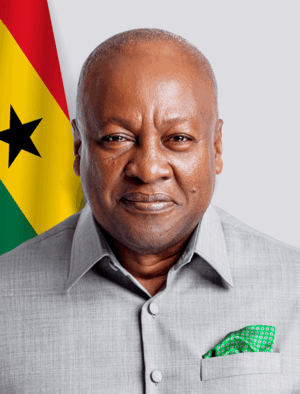By Ephraim Ofori NUMOSUOR
As the clock strikes the 100-day mark of President John Dramani Mahama’s return to Ghana’s highest office, the nation pauses to assess the tone, tempo, and trajectory of his new administration.
After securing a historic re-election in the 2024 polls, expectations have been sky-high, and rightly so. The return of a former president, especially in a period of deep economic and institutional disillusionment, is not just a change in leadership but a mandate for transformation.
President Mahama’s first 100 days have been a period marked by bold reforms, controversial appointments, and a series of swift executive decisions that reveal the direction his second administration is poised to take.

While some laud his energy and clarity of purpose, others raise flags about whether ambition is running ahead of accountability.
A leaner cabinet, a louder message
One of Mahama’s first and most applauded moves was the reduction of ministries from over 30 to just 23. In a political culture where bloated governments have long strained public finances, this action sent a clear message: this presidency means business.
The swift nomination and vetting of 56 ministers and deputies; a mix of fresh faces, loyal returnees, and technocrats; ensured that the machinery of government got to work almost immediately. It was a signal not just of competence, but of calculated urgency.
A surge of appointments: merit and loyalty
Beyond cabinet, the president moved quickly to fill leadership roles in state institutions and agencies. Heads of state-owned enterprises, boards, and special advisors were reshuffled or replaced altogether, in what some see as a “housecleaning” and others view as political rebalancing.
Critics argue that while the appointments may reflect political loyalty, they risk reinforcing a winner-takes-all culture. Supporters counter that the president is simply assembling a team he can trust to execute his vision with fidelity and speed.
A new economic order: tax reliefs for the people
Perhaps one of the most tangible victories in the president’s early days has been the abolition of several taxes that burdened businesses and ordinary citizens. The 2025 budget outlined the removal of:
- The 15percent VAT on electricity consumption for residential users,
- The Emissions Levy,
- The Betting Tax,
- The COVID-19 Health Recovery Levy
These tax cuts have been widely welcomed by the public and business community, with many seeing them as a first step toward restoring consumer confidence and boosting disposable incomes.
The move to reduce tax refund from 6percent to 4percent to cover up for revenue loss by the abolishing of these taxes has been hailed by business pundits as a smart move.
A new constitution on the horizon?
In a bold and unexpected move, President Mahama announced the formation of a Constitutional Review Implementation Committee, a revival of long-standing calls for constitutional reforms.
This committee is tasked with implementing recommendations from the 2011 Constitutional Review Commission, including changes to the powers of the executive, the role of local government, and accountability systems. By reigniting the conversation on constitutional reform, Mahama is making a strong pitch for deeper democratic development.
Education and youth development
Education has featured prominently on Mahama’s early agenda. He has moved to revive abandoned E-block and TVET projects, ordered a review of the Free SHS policy, and secured a permanent funding for it.
The president has also hinted at a national youth employment program, targeting job creation and entrepreneurship. With youth unemployment still a pressing issue, his ability to turn policy into progress will define the credibility of these early promises.
Environmental governance meets resistance
President Mahama’s directive to halt mining in forest reserves and water bodies, and his move to establish the Ghana Gold Board to regulate artisanal gold mining, signal his commitment to tackling illegal mining.
However, the Obuasi mine shooting incident, involving soldiers and small-scale miners cast a shadow over these efforts, reminding the nation that enforcement must be balanced with engagement.
Economic recovery vs. public patience
The administration inherited a shaky economy. With inflation, debt, and unemployment remaining critical issues. The government’s strategy of “shock therapy”, cutting wasteful spending while investing in productive activities, is a high-risk, high-reward approach. Plans to renegotiate elements of the IMF program show a willingness to balance fiscal discipline with domestic priorities.
A presidency in motion
President Mahama’s first 100 days have been intense, calculated, and at times controversial. He has hit the ground running with policy direction, executive action, and institutional overhaul.
Yet, with the dust of transition settling, the real work begins, delivering tangible change in the lives of ordinary Ghanaians. The next 100 days will tell whether these bold moves were the foundations of legacy or merely the echoes of political theatre.
>>>the writer is a financial Economist, Research and policy analyst, known for his commentary on political economy, institutional reform, and public policy in Ghana and across Africa. He can be reached via [email protected] and or 0248803710










